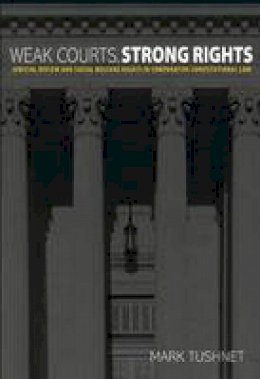9%OFF

Stock image for illustration purposes only - book cover, edition or condition may vary.
Weak Courts, Strong Rights: Judicial Review and Social Welfare Rights in Comparative Constitutional Law
Mark Tushnet
€ 38.99
€ 35.31
FREE Delivery in Ireland
Description for Weak Courts, Strong Rights: Judicial Review and Social Welfare Rights in Comparative Constitutional Law
Paperback. Shows how creating weaker forms of judicial review may actually allow for stronger social welfare rights under American constitutional law. This book describes how weak-form review works in Great Britain and Canada and discusses the extent to which legislatures can be expected to enforce constitutional norms on their own. Num Pages: 312 pages. BIC Classification: 1KBB; JKS; JPQB; LNAA1; LNTH. Category: (P) Professional & Vocational; (U) Tertiary Education (US: College). Dimension: 233 x 156 x 20. Weight in Grams: 414.
Unlike many other countries, the United States has few constitutional guarantees of social welfare rights such as income, housing, or healthcare. In part this is because many Americans believe that the courts cannot possibly enforce such guarantees. However, recent innovations in constitutional design in other countries suggest that such rights can be judicially enforced--not by increasing the power of the courts but by decreasing it. In Weak Courts, Strong Rights, Mark Tushnet uses a comparative legal perspective to show how creating weaker forms of judicial review may actually allow for stronger social welfare rights under American constitutional law. Under strong-form judicial review, as in the United States, judicial interpretations of the constitution are binding on other branches of government. In contrast, weak-form review allows the legislature and executive to reject constitutional rulings by the judiciary--as long as they do so publicly. Tushnet describes how weak-form review works in Great Britain and Canada and discusses the extent to which legislatures can be expected to enforce constitutional norms on their own. With that background, he turns to social welfare rights, explaining the connection between the state action or horizontal effect doctrine and the enforcement of social welfare rights. Tushnet then draws together the analysis of weak-form review and that of social welfare rights, explaining how weak-form review could be used to enforce those rights. He demonstrates that there is a clear judicial path--not an insurmountable judicial hurdle--to better enforcement of constitutional social welfare rights.
Product Details
Publisher
Princeton University Press United States
Number of pages
288
Format
Paperback
Publication date
2009
Condition
New
Weight
413g
Number of Pages
312
Place of Publication
New Jersey, United States
ISBN
9780691143200
SKU
V9780691143200
Shipping Time
Usually ships in 4 to 8 working days
Ref
99-1
About Mark Tushnet
Mark Tushnet is the William Nelson Cromwell Professor of Law at Harvard Law School. His many books include The New Constitutional Order and Taking the Constitution Away from the Courts (both Princeton). He is a fellow of the American Academy of Arts and Sciences.
Reviews for Weak Courts, Strong Rights: Judicial Review and Social Welfare Rights in Comparative Constitutional Law
In this study of various theoretical issues of concern to students of comparative constitutional law, Tushnet has done a remarkable job of analyszing and comparing existing forms of judicial review...Tushnet's impeccable research leads us through varied constitutional systems including, for example, Argentina, Canada, Great Britain, and Ireland. This is constitutional scholarship at its best.
R.J. Steamer, Choice Tushnet explores two prominent questions that constitutional drafters must ask: What powers of judicial review should courts have? and What rights should be enumerated? ... Tushnet's ambitious agenda in Weak Courts, Strong Rights is equally important for political scientists and comparative legal scholars.
Theresa J. Squatrito, Comparative Political Studies Mark Tushnet has written an important book, featuring mastery of pertinent comparative constitutional law literature and an incredible ideas-per-ink ratio... Any serious scholar of comparative constitutional law cannot afford to skip this book.
Ran Hirschl, Ottawa Law Review
R.J. Steamer, Choice Tushnet explores two prominent questions that constitutional drafters must ask: What powers of judicial review should courts have? and What rights should be enumerated? ... Tushnet's ambitious agenda in Weak Courts, Strong Rights is equally important for political scientists and comparative legal scholars.
Theresa J. Squatrito, Comparative Political Studies Mark Tushnet has written an important book, featuring mastery of pertinent comparative constitutional law literature and an incredible ideas-per-ink ratio... Any serious scholar of comparative constitutional law cannot afford to skip this book.
Ran Hirschl, Ottawa Law Review
